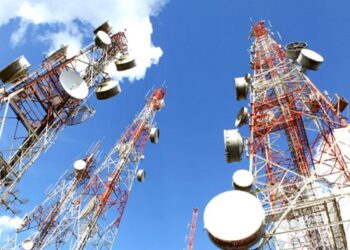The Nigerian Communications Commission (NCC) has expressed grave concern over the increasing damage to telecommunications infrastructure nationwide, revealing that MTN, Airtel, 9mobile, and other telecom operators now record an average of 1,100 fibre cuts every week.
This was disclosed by the Executive Vice Chairman of the NCC, Dr. Aminu Maida, during the Critical National Information Infrastructure (CNII) and Sustainability Conference held in Lagos on Thursday.
The event, organised by the Nigeria Information Technology Reporters Association (NITRA) and the Association of Licensed Telecommunication Operators of Nigeria (ALTON), focused on the theme: “Critical National ICT Infrastructure and Industry Sustainability: Way Forward.”
Maida, who was represented by Director of Technical Standards and Network Integrity at NCC, Mr. Edoyemi Ogoh, said the operators also record an average of 545 access denial cases and 99 theft incidents weekly, all of which threaten service delivery, operational stability, and national security.
“These are not just numbers. They reflect a national emergency. Every fibre cut, every theft, and every case of sabotage contributes to dropped calls, failed transactions, interrupted emergency services, and economic losses,” Maida warned.
A threat to the digital economy
The NCC boss stressed that the persistent damage to telecom infrastructure has become a major obstacle to Nigeria’s digital transformation goals.
With the economy increasingly reliant on resilient digital networks, disruptions caused by vandalism and neglect are stalling progress.
“Our fibre networks, towers, and data centres are the digital lifelines of the Nigerian economy. Any disruption to them has far-reaching consequences,” he said.
- Maida further noted that telecom infrastructure had been officially designated as Critical National Information Infrastructure (CNII) by President Bola Tinubu under Section 3 of the Cybersecurity Act—placing a national security responsibility on operators, service providers, civil society, and citizens alike.
- To address the crisis, he said the Commission has adopted a multi-pronged strategy involving technical enforcement, public sensitisation, and collaboration with national security agencies.
- Maida noted that NCC is currently enforcing compliance with infrastructure deployment standards, particularly in fibre-laying and tower construction.
He added that a nationwide awareness campaign is underway across radio, social media, and multimedia platforms to educate Nigerians on the far-reaching impacts of vandalism.
“We are ensuring Nigerians understand that damage to telecom infrastructure affects not just big companies, but ordinary people who depend on mobile services, ATMs, hospitals, and emergency alerts,” he said.
He said the Commission is also working closely with the Office of the National Security Adviser (ONSA) to align telecom protection efforts with Nigeria’s broader security architecture.
Industry must take responsibility
Speaking at the event, Chairman of ALTON Mr. Gbenga Adebayo, echoed the NCC’s concerns and urged operators to take greater responsibility for infrastructure protection.
- He criticised operators who failed to implement basic security measures such as perimeter fencing, locks, or surveillance systems.
- Adebayo also lamented the existence of a black market for stolen telecom components, including generators, batteries, and cables, which he said encourages vandalism.
“Some of these thefts are carried out by insiders who know the system. The ease of selling stolen equipment in local markets makes it worse,” he said.
Adebayo called for stricter enforcement and prosecution of offenders, insisting that those caught with stolen infrastructure must face the full weight of the law to deter others.
- In his remarks, Chairman of NITRA, Mr. Chike Onwuegbuchi, proposed the establishment of a Telecom Infrastructure Protection Trust Fund, similar to the security trust fund model, to tackle the crisis head-on.
- He emphasised the need to educate communities on the dangers of vandalism, which he said directly affects access to essential services such as communication, banking, and emergency response.

























